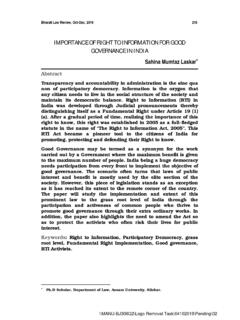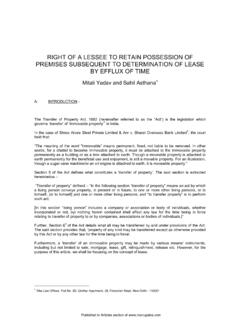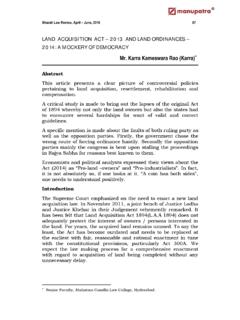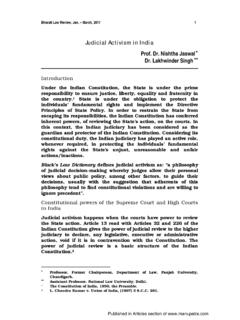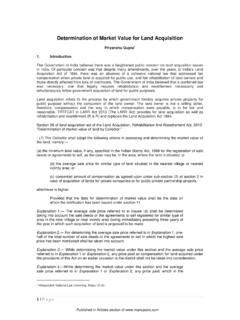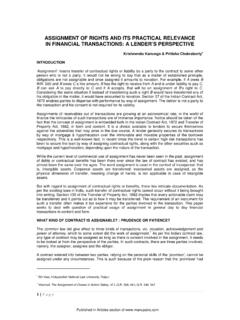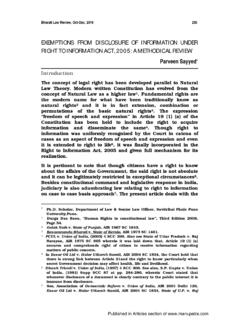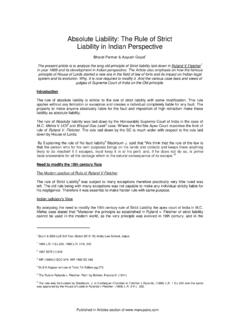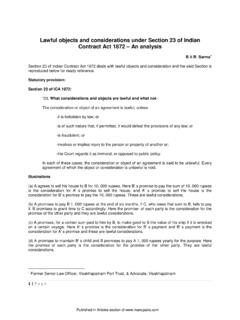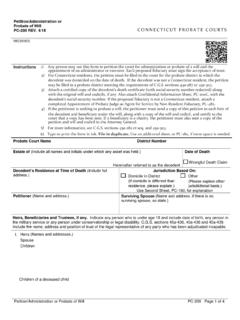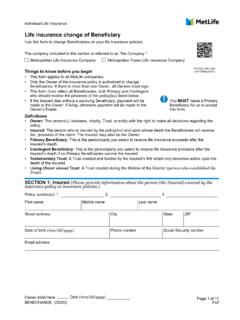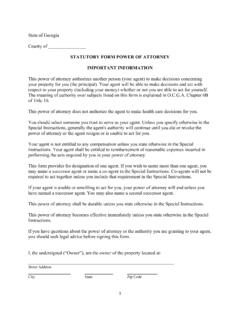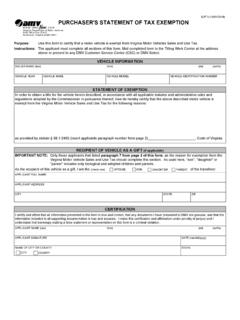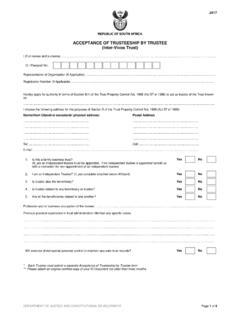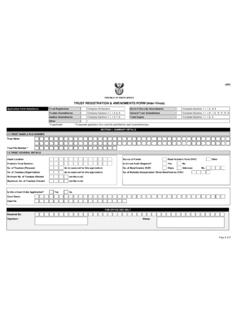Transcription of Law Relating To Suspension And Revocation Of Gift
1 1 Law Relating To Suspension And Revocation Of Gift1 1. Introduction. According to Section 122 of Transfer of Property Act, 1882 gift is defined as the transfer of certain existing moveable and immoveable property made voluntarily and without consideration, by one person called the donor, to another, called the donee, and accepted by or on behalf of the donee. gift , as defined in this section, is gratuitous transfer of ownership in some existing property made voluntarily. The definition includes gift of both movable as well as immovable property. The transferor is called donor and the transferee is called donee. There are certain essentials of a gift like a must transfer of ownership, the ownership must relate to a property in existence, the transfer must be without consideration, it must have been made voluntarily, the donor must be a competent person and lastly the transferee must accept the gift .
2 A gift is a transfer of property without any monetary consideration by one person in favour of another and accepted by him or by a person on his behalf. Transfer without consideration is called a gratuitous transfer. A gratuitous transfer may take place between two living persons or, it may take place only after the death of the transferor. gift may, therefore, be either inter vivos or, testamentary. gift inter vivos is gratuitous transfer of ownership between two living persons and is a transfer of property within the meaning of Section 5 of Transfer of Property Act, 1882. gift testamentary is called a will which is transfer by operation of law and is outside the scope of this Act. A gift made during apprehension of death is called a gift mortis causa. A gift , where both the parties are Muslims, is governed by the provisions of Quranic Law, and not by the Transfer of Property Act as it is inconsistent with the provisions of this act.
3 1 Priyanshu Gupta, Hidayatullah National Law University, Raipur ( ), mail id- Mob. No. +91-9630817348. Published in Articles section of 2. Essentials Of A gift . The essentials of a valid gift are given below:2 There must be transfer of ownership: As in case of a sale, there must be a transfer of all the rights in the property by the donor to the done. It may, however, be noted that it is permissible to make conditional gifts. The only restriction is that the condition must not be repugnant to nay of the provisions of Section 10 to 34 of the Transfer of Property Act, 1882. The ownership must relate to a property in existence: gift must be made of existing movable or immovable property capable of being transferred. Future property cannot be transferred. The share obtained after partition of the joint family property can be gifted.
4 Even a gift of property that is obtained after a preliminary decree of partition is passed by the court is valid. The transfer must be without consideration: The word consideration refers to monetary consideration and does not include natural love and affection. If the consideration is a nominal amount of money or the property is grossly undervalued yet the transfer would not be a gift but a sale. In fact, the passing of money as a consideration, howsoever small it may be, would destroy the nature of transfer as a gift . Gifts in lieu of expectation of spiritual and moral benefit or a promise to look after the donor in her old age or through our life are transactions without any consideration. A transfer executed for consideration of a donee undertaking the liability of the donor is not gratuitous, and not a gift . It must have been made voluntarily: The offer to make the gift must be voluntary.
5 A gift therefore should be executed with free consent of the donor. This consent should be untainted by force, fraud or undue influence. Mere relationship between the donor and donee is not a conclusive fact of the exercise of undue influence and it must be proved that the transaction is unconscionable. The donor must be a competent person: 2 Section 122, Transfer of Property Act, 1882. Published in Articles section of Donor is the person who makes the gift . In a transaction by way of gift the transferor is called a donor and he divests his ownership in the property so as to vest it in the transferee, the done. The donor must be a sui juris. He must have therefore attained the age of majority, possess a sound mind and should not be otherwise disqualified.
6 Section 7 of this Act provides that only such persons can effect a transfer of property who are competent to contract. The result is, therefore, that a minor cannot make a gift of his properties. According to Halsbury s Laws of England3, persons in fiduciary positions, , trustees cannot make gifts of the property vested in them on behalf of others unless they are authorised to do so. The transferee must accept the gift : The gift must be accepted by the donee himself. Acceptance can be validly given by a minor donee himself or by his mother or guardian or by an agent is case of a deity. If the guardian gives the acceptance on behalf of the minor the minor on attaining majority can either accept it or reject it. If a gift is made to two or more persons, one of whom is capable of taking and the other is not, it has been held that the former will take the whole of the Acceptance must be made during the lifetime of the donor and while he is capable of giving.
7 According to Section 122 if the donee dies before the acceptance of gift the gift is void. 3. Suspension Or Revocation Of gift . Section 126 of Transfer of Property Act, 1882 deals with when gift may be suspended or revoked. According to it, the donor and donee may agree that on the happening of any specified event which does not depend on the will of the donor a gift shall be suspended or revoked but a gift which the parties agree shall be revocable wholly or in part, at the mere will of the donor is void wholly or in part as the case may be. A gift may also be revoked in any of the cases in which if it were a contract it might be rescinded. Such as aforesaid a gift cannot be revoked. Nothing contained in this section shall be deemed to affect the rights of transferees for consideration without notice. gift is transfer of ownership without consideration.
8 Like other transfers, gift too can be made subject to certain conditions. Donor may make a gift subject to a condition of it being 3 Vol. 15, para 795. 4 Nandi Singh v. Sita Ram, (89) 16 Cal. 677; 16 Ind. App. 44 ( ). Published in Articles section of suspended or revoked. But, such gifts would then be governed by those provisions of this Act which regulate conditional transfers. Accordingly, if a gift is made subject to condition of it being revoked in future the condition must be valid and enforceable under those provisions. Section 126 lays down two modes of Revocation of gift : (i) Revocation by mutual agreement of donor and donee. (ii) Revocation by rescission as in the case of contracts. Revocation by Mutual Agreement: Donor and done may agree that the gift shall be suspended or revoked upon happening of an event not dependant on the will of the donor.
9 The condition revoking the gift must be express; it should not be merely in the form of a wish or desire. In other words, the condition on the non-fulfilment of which the donor may revoke the gift must be expressly laid down in the gift . A gift of certain properties was executed in lieu of the past and future services rendered by done to donor. But failure of done to render services to donor or to maintain donor in future, was not specified to be a condition for Revocation of the gift deed. The Himachal Pradesh High Court5 held that since the condition for Revocation of gift upon donee s failure to render services to the donor was not laid down in the deed, it was unconditional gift and, therefore, cannot be revoked by the donor. However, even though a condition is not laid down in the gift deed itself, and has been provided under a mutual agreement separately but forms part of the transaction of gift , the condition would be valid and The condition upon which a gift is to be revoked must not depend solely on the will of the donor.
10 A gift revocable at the pleasure of donor is no gift at all. The condition or stipulation providing for Revocation must have been mutually agreed upon at the time of the gift . If such agreement is made after completion of gift , since the gift has already become absolute, it cannot be revoked. However, it s not necessary that stipulation for Revocation is given in the deed of gift itself. What is necessary is that stipulation and gift both are made at the same time. They might be in two separate documents but must form part of the same transaction. That is to say, the stipulation must relate to the same gift which is to be revoked. 5 Mool Raj v. Jamma Devi, AIR 1995 HP 117. 6 Thakur Raghunathjee Maharaj v. Ramesh Chandra, AIR 2001 SC 2340. Published in Articles section of The condition for Revocation of gift is a condition subsequent.
